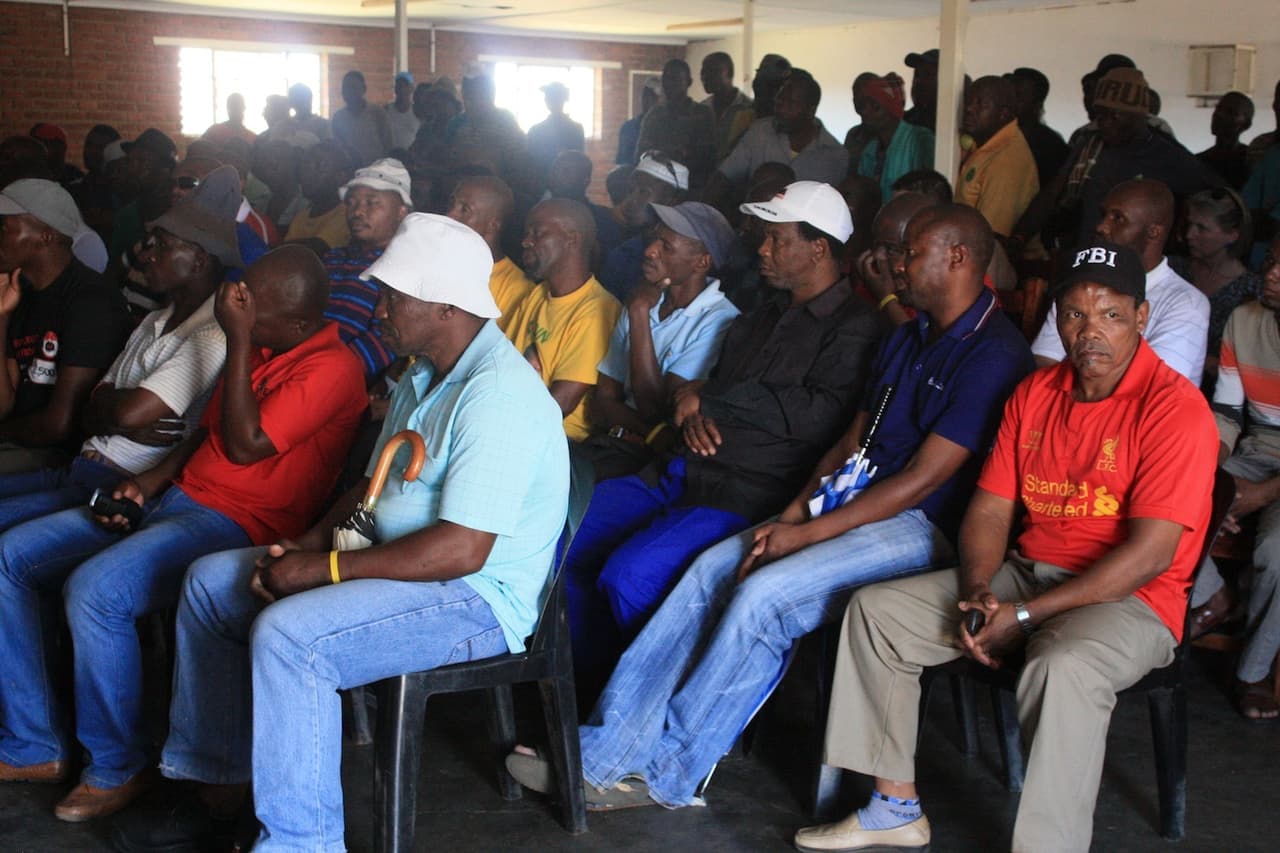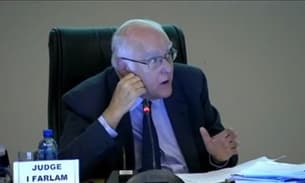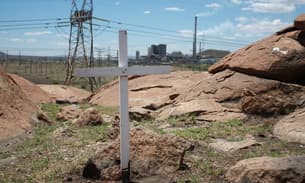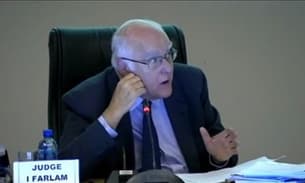
Voices from the front line: Victims of the Marikana massacre speak out
Miners and their families get feedback at a support meeting (Maeve McClenaghan)
Makopano Thelejane
With shaking hands Mrs Makopano Thelejane reaches into her crumpled black handbag and pulls out a green, plastic A5 folder. Inside she keeps the passport of her late husband Johannes alongside a neatly folded certificate authorising the 56 year old man to work as a rock drill operator in Lonmin’s Marikana mines.
On the morning of the 16th of August 2012 Johannes told his wife he had heard rumours that the strike was about to break and the workers would go back to work. Curious about the news he went along to the rocky hillside that had become the meeting place for the striking miners. Hours later he was shot dead when the police moved in to break up the strike.
But for Mrs Thelejane the heartbreak did not end there. Johannes was one of 10,000 contract workers contracted at the mine, rather than a Lonmin employee. He was the only contract worker to be killed.
Because her late husband was not a full employee Mrs Thelejane gets none of the regular compensation given out to other widows. ‘I don’t get any help from Lonmin, they told me he was not a permanent worker,’ she said.

In December 2012 other widows’ families got food packages, but nothing arrived for her. Three months ago when the company held an anniversary commemoration ceremony, Mrs Thelejane says she was not invited, ‘they told me it was for employees only,’ she says.
Lonmin argues that, while it provided financial support, the company was not responsible for the invitations to the ceremony. It says that the company paid for Mr Thelejane’s funeral.
Now Mrs Thelejane supports her two adult children and 8 year old grandchild through handouts from friends and generous strangers.
Related article: Questions raised about role of British company in South African mining massacre
Since the shooting she spends each day sitting in the back-row corner of the Farlam commission, the official inquiry into the killings at Marikana, quietly listening as witness after witness lays out their testimony.
She does not have high expectations for the commission’s outcome, ‘not after the way I have been treated,’ she explains. But she does have her own thoughts on where responsibility lies. ‘I blame Lonmin’, she says quietly, ‘Johannes wanted to go back to work, he went there that day to get feedback on how to do that, and that’s when he was killed.’
The miners
Friends Thando and Tulani stand in the shade cast by the roof of the meeting hall. It is 11am and the sun is hot and high as they wait for the Marikana Support Campaign meeting to begin.
Thando is a rock drill operator at Lonmin. Tulani a former Lonmin employee. Both took part in the August 2012 protest, and still feel anger at the National Union of Mine Workers (NUM), the police, and the company.
‘We blame Lonmin,’ explained Tulani. ‘Instead of coming to the workers they called the police.’
‘If Lonmin came to the workers it would have solved the problem,’ said Thando.

- Broken crosses at Marikana
‘We also blame NUM, they started to shoot the workers. We were members of NUM before they came out and shot at us,’ added Tulani. Two people were shot and wounded by the NUM shop stewards.
Emotions were running high and in the week before the shootings ten people had been killed, including two police officers and two of Lonmin’s security guards. Lonmin officials have suggested that they thought it was too dangerous to address the workers in person.
An hour later and the low roofed community hall on the Lonmin complex is full with over 200 men and women, too many for the plastic chairs lined up for them. People stand crowded in rows at the back.
As familiar names are mentioned rumbles of anger ripple around the hall. At the mention of Barnard Mokwena, Lonmin’s executive vice president for human capital, many workers break into fevered whispers. As Cyril Ramaphosa, former non-executive director of Lonmin and current deputy of the ANC, is named the whispers turn to shouts of anger.
Twenty-seven year old Mkhuseli has more reason than most to be angry. He was in the first group of men that the police shot at. He survived without being hit, but saw his friends and colleagues gunned down around him.
‘The commission is just run by the government, they are arresting the miners but not the police,’ he tells me sadly.
As the meeting ends Mkhuseli leaves the hall and is greeted by the looming structures of the Lonmin mine, its field of electricity pylons mocking the informal settlement of tin shacks nearby. Most have no power there.
A short walk down the road is the rocky hillside where the shooting took place. Most of the white crosses that had been set to commemorate the dead have been broken and lie in a discarded heap at the foot of the hill.
The miners walk on home. Some stop to show their scars, bullet-wounds in arms, legs, chests. One miner explains that he was shot eight times, three times in the groin. Another, a rock drill operator, is back working down the mines with a shoulder full of metal.
But the wounds go deeper.
‘You see sister,’ Mkhuseli tells me, ‘we are heartbroken.’
Lonmin declined to comment on the issue, stating that it has undertaken not to comment publicly on issues under investigation before it has given evidence and representations to the Farlam commission.
A spokesperson said: “The company believes that this is vital to ensure the integrity of the inquiry, and to avoid pre-empting its processes or subsequent findings.”




